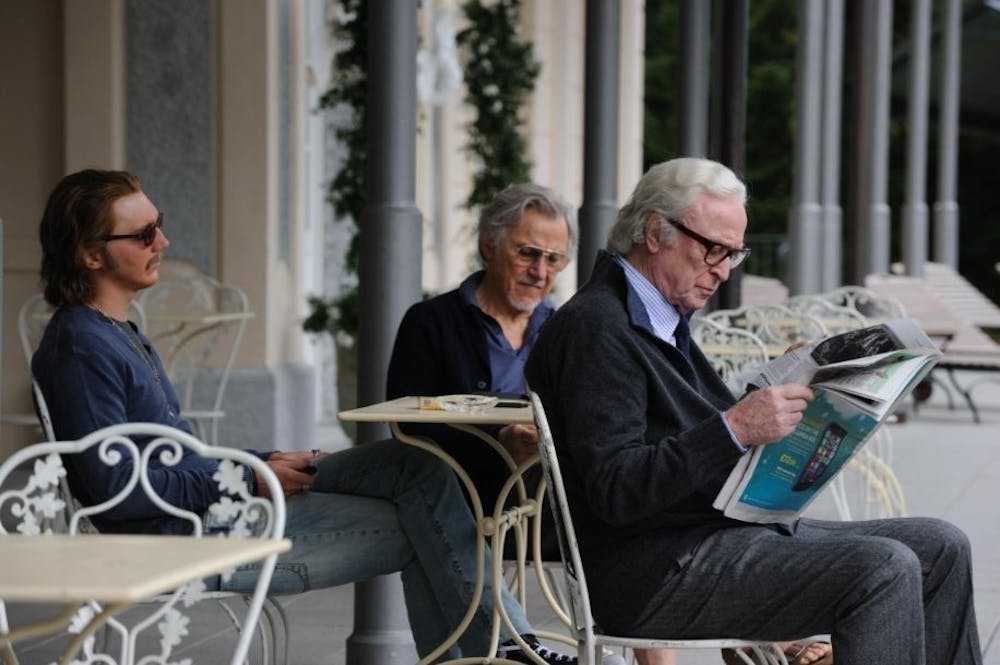Paolo Sorrentino entered the American conscience after his 2013 film “The Great Beauty” won the Oscar for best foreign film in 2014. He has often been compared to the Italian great Federico Fellini. Sorrentino explored many of Fellini's favorite themes in "The Great Beauty" and again in this year’s “Youth”: the emptiness of life and the effect on memories as we age.
Fellini has examined this through booze, drugs and sex addicts, but Sorrentino’s “Youth” inspects the loneliness of the last years of Fred Ballinger (Michael Caine) and Mick Boyle’s (Harvey Keitel) lives. “Youth” amounts to an airy, gorgeous reflection on what it means to age, with some of the years best performances and occasional intoxicating depths.
Longtime best friends Fred, a retired composer and maestro, and Mick, a working film director, take their annual vacation at a resort in the Swiss Alps. While Mick works with a team of young filmmakers to make his latest film, Fred relaxes, until emissaries that work for Queen Elizabeth II approach him to perform for Prince Philip’s birthday. Also staying at the resort are many interesting characters including Fred’s daughter Lena (Rachel Weisz), who struggles with a broken heart after Mick’s son left her, a young and talented actor, Jimmy Tree (Paul Dano) and Miss Universe (Madalina Diana Ghenea playing herself).
The cast of elderly all-stars and successful Gen X pros elevate Sorrentino’s musings, as they feed off of each other, while their lives draw parallels. Jimmy and Fred discuss their filmography and composition and realize that their downfall both were related to the desire of levity. It becomes more apparent that there are similarities between everyone’s situation despite their difference in age; the most glaring being empathy, memory and feeling.
Since Fred and his wife split, Lena found her father unfeeling and apathetic. As “Youth” goes on, Sorrentino explores Fred’s relationship with everyone at the resort and the audience sees through his eyes a monk, a couple who doesn’t speak to each other, a young masseuse and many other characters. Where “Youth” strives is when Sorrentino takes it a step further and examines all of these characters in an unbiased perspective, producing omniscience. Sorrentino exposes that what Fred perceives of himself and others isn’t always the truth.
This idea of jaded perceptions is really driven home when Mick meets with his frequent collaborator and favorite starlet, Brenda Morel (Jane Fonda). The film’s trajectory naturally points to this brief encounter and the scene is a perfect collision of expressive, feisty Sorrentino and campy Fonda.
When the film explores the concept of memories and how they are lost in age, it is often very insightful and poetic, but these instances are spread out amongst the run time. However, like any Sorrentino film, there is never a shortage of beautiful imagery.
The Swiss Alps are a photogenic set, but cinematographer Luca Bigazzi plays them gorgeously in many wide shots, letting the mountains speak for themselves. There isn’t a deficiency in inspired musical moments either, whether it is guest performers covering popular songs, David Lang’s (best known for “Requiem for a Dream”) dreamy score, or the Fred Ballinger’s composition "Simple Song #3."
Despite being in English, “Youth” is an entirely European film, which may prove frustrating for viewers that don’t know what to expect. “Youth” doesn’t necessarily live or die by the rules of possibility or plausibility and takes many turns that aren’t supposed to be seen at face value. The last act is a surreal affair that blends the lines of reality and a dream. Ultimately, the narrative isn’t necessarily supposed to be followed or solved, but a filmgoer should merely expect to be mystified by Sorrentino’s spell.
In weaker hands, “Youth” could’ve been conceived as an empty, pretentious vanity project, but Sorrentino brings his own flair and passion. The integration of the American movie stars, the Swiss Alps and an Italian director creates a unique viewing experience that challenges its audience and especially appeals to the artiste type.
Related Links:
Lesbian drama 'Carol' exceeds labels, becoming one of Hollywood's greatest love stories
'Brooklyn' beats mediocrity thanks good acting, capable direction
Reach the reporter at tanner.stechnij@asu.edu or follow @tannerstechnij on Twitter.
Like The State Press on Facebook and follow @statepress on Twitter.




